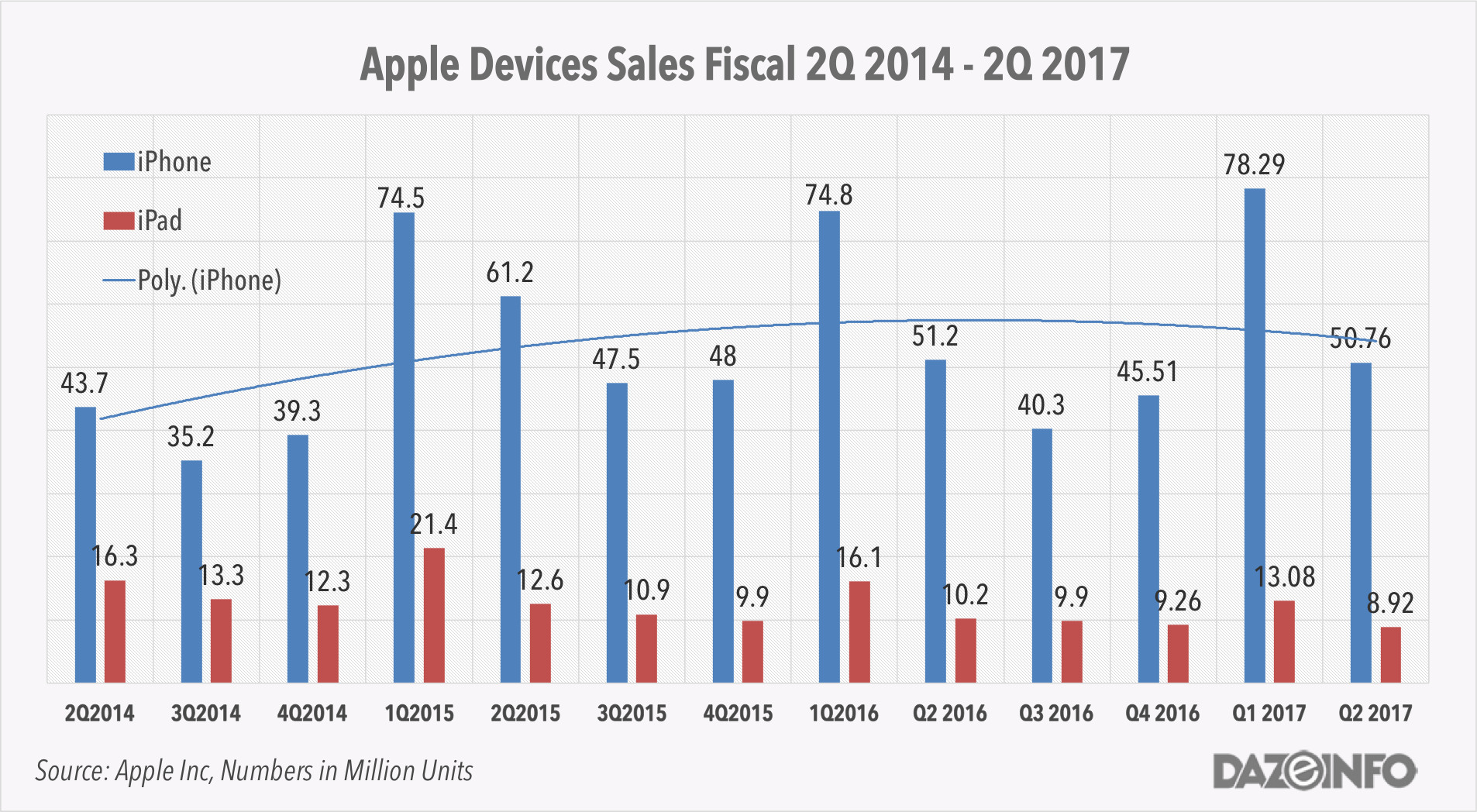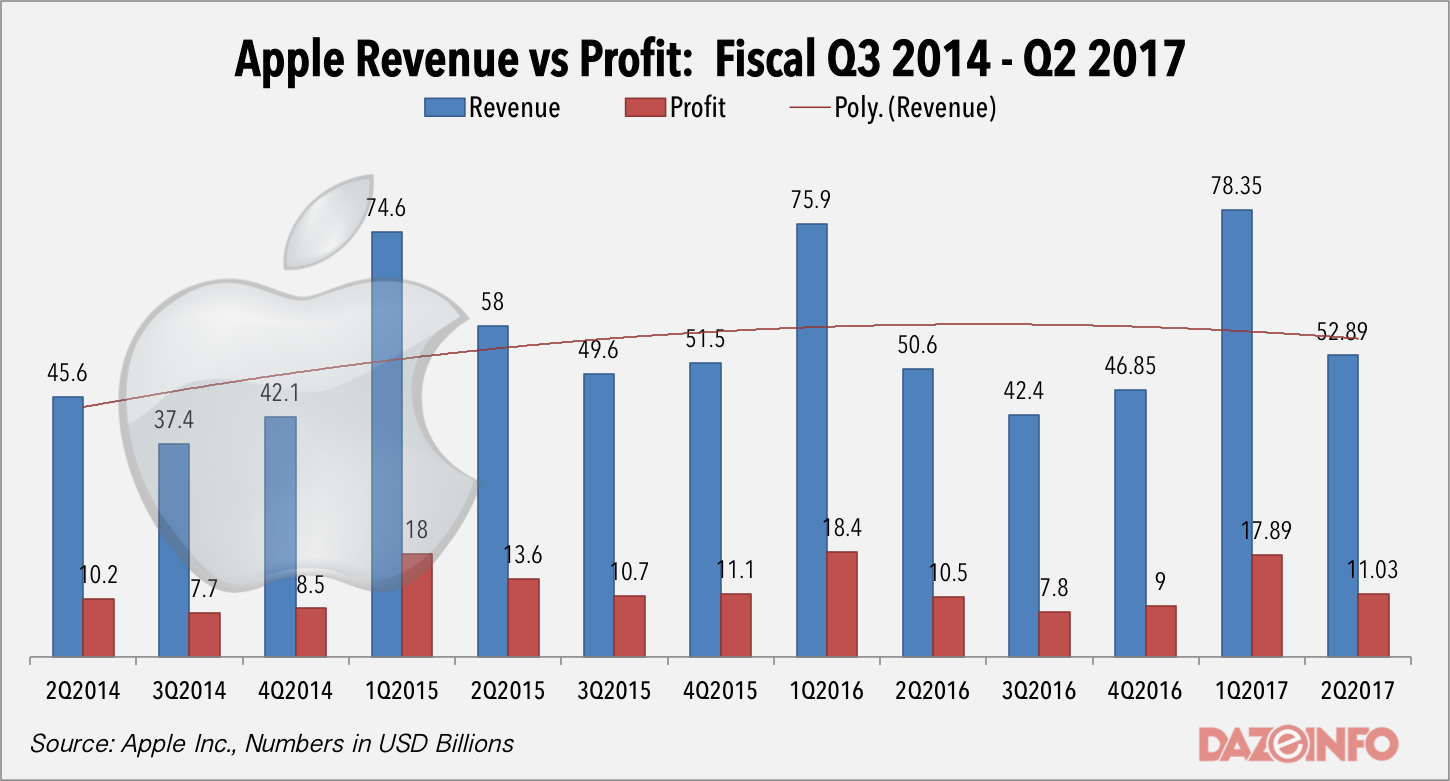The 9th of May 2017 marked a milestone for smartphone manufacturer and tech giant Apple Inc. (NASDAQ:AAPL). For the first time ever, the valuation of Apple crossed $800 billion. This makes Apple the first US company to ever do so and is yet another feather in Apple’s already gilded cap. However, this news is little bittersweet for Apple, coming on the heels of a disappointing fiscal Q2 financial report. The report outlined declining iPhone and iPad sales, and lower revenue estimates for upcoming quarters.
But this is not the first time in the history of Apple that quarterly sales of iPhone, revenue and profit have declined in a quarter. In the last few years, Apple has been witnessing similar trends in few quarters and falling short of expectations. In contrast, despite all odds, the valuation of Apple has been soaring.

So why do Apple’s stock prices keep rising despite a disappointing fiscal quarter, especially after Q2 2017? And what can we expect in the near future?
Apple Is The Most Valuable US Company
Apple’s stock closed at a record $153.96 on 9 May. This 2.9% hike in share price, along with the 5.21 billion outstanding shares put Apple’s valuation at a mind-blowing $802.72 billion. This makes Apple the most valuable US company by a fair margin. Google’s parent company, Alphabet Inc. (NASDAQ:GOOGL) trail at a distant second at $658.60 billion, followed by Microsoft Corporation (NASDAQ:MSFT) at $533.02 billion and Amazon.com Inc. (NASDAQ:AMZN) at $455.42 billion.
Just to put this incredible achievement in perspective – Apple’s stock is up 57,403% since its IPO in 1980! It is also nearly 750% higher than ten years ago during the launch of the original iPhone. This is quite an impressive turnaround after its market cap fell to around $500 billion around the start of 2016.
This upward trend in Apple share prices has been holding for a while now. Shares have skyrocketed nearly 33% this year alone. The median price target on Apple is now $160, up from the $140 a mere three months ago. What’s more interesting is that analysts expect this trend to continue. Analysts at Dexel Hamilton have upped Apple’s 12-month price target to $202 billion, effective putting the company on course for a $1 trillion valuation in the very near future. And, when they will happen – sooner or later – Apple would become the first technology company and only the second company in the world to clock the valuation of $1 trillion.

Apple’s Cash Hoard Swells Despite Poor Q2 Performance
Apple’s market capitalization is no the only thing that has skyrocketed as of late. Apple recently confirmed that their cash reserves now stand at a mammoth $256.8 billion. This development is surprising, considering Apple’s not-so-fabulous performance in its second financial fiscal quarter. Smartphone shipments were down 0.63% YoY, falling short of expectations. We also outlined previously how shipment growth for Apple was mostly flat in 2016. Since Tim Cook became CEO, Apple has returned nearly $200 billion to shareholders, while increasing R&D spend. Despite this, Apple’s cash reserves seem to keep swelling endlessly. However, more than 90% of this cash is held overseas. Apple is hoping for a one time “tax holiday” from the Trump administration. They would use it to repatriate their overseas cash. This cash could subsequently be used to finance one of the many rumoured acquisitions that Apple is reportedly planning.
Driving Factors Behind Apple’s Incredible Valuation
Despite all this, these new developments beg the question – Why is Apple’s stock up despite poor sales? There are a few crucial factors behind it:-
- Stock Buybacks – Stock buybacks have revitalised Apple shares. The company reduced their actual share count by 20.9% and the average diluted shares outstanding by 20.5% over the past 4 years.
- Warren Buffet’s Investment – We previously reported billionaire investor Warren Buffett’s newfound interest in Apple. His company, Berkshire Hathaway increased its investment in Apple by 400% to 57 million shares in Q4 2016, leading to a surge in Apple shares.
- Anticipation for the iPhone 8 – Apple CEO Tim Cook claims that anticipation for the iPhone 8 is the primary factor behind flagging iPhone sales in their second fiscal quarter. However, this dark cloud has a silver lining. Apple’s share prices have experienced rapid appreciation this year, primarily due to the hotly anticipated 10th-anniversary edition of the iPhone.
- Apple Still Manage Revenue Growth – Despite iPhone sales not meeting expectations, Apple’s revenue for its second fiscal quarter went up to $53.02 billion. Apple’s net profit also registered an increase of 4.76% during this time period. This is primarily due to higher than average prices and their fledgeling service business.
- Apple’s Burgeoning Service Business – Apple’s service business has experienced significant growth in the past year, now accounting for their second biggest revenue share at 13%. This segment experienced nearly 18% growth YoY among stagnating iPhone shipments and alarmingly plunging iPad shipments. This can be attributed in large part to the runaway success of Apple Music among other Apple services.
Takeaways
- Apple’s stocks continue to appreciate at a rapid pace, and we may see Apple crossing the $1 trillion thresholds within the year.
- Apple’s cash reserves have grown in conjunction with their market cap. If they are granted a tax holiday, Apple may look to invest a portion of it in a big money acquisition. Rumoured acquisition targets include Tesla, Disney and Netflix.
- Apple’s inflated market valuation is highly contingent on the upcoming iPhone 8. If sales aren’t up to snuff, Apple could see their stock and valuation come crashing down.
- Apple’s service business is thriving. With iPhone sales stagnating, expect them to expand their service business to drive growth in the near future. Apple may look to acquire a media streaming company such as Netflix to aid them in this quest.

